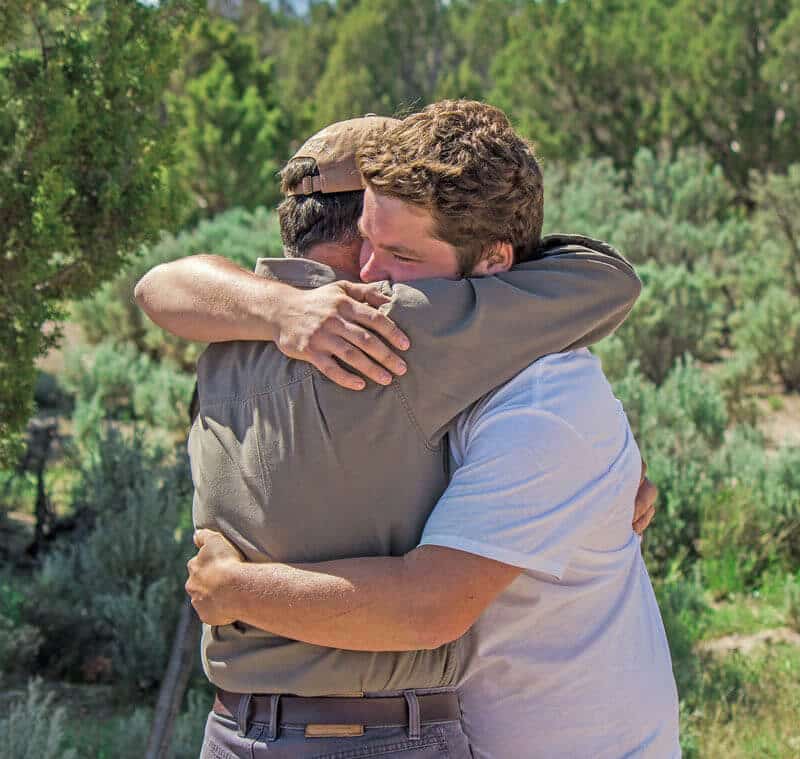
When to Consider Nature Treatment: A Parent's Guide
Technology addiction can transform a once-active teen into someone disconnected from real life, leaving parents feeling helpless despite trying various interventions. In this podcast episode, LCSW Tiffany Herlin and ACMHC Greg Allred from ThreePeaks Ascent discuss how nature-based residential treatment can help break technology addiction and rebuild family connections.
They explore when to consider intensive treatment, the healing power of nature therapy, and the program's daily structure, including therapy, academics, and family involvement. At ThreePeaks Ascent, teens receive 24/7 therapeutic support while disconnecting from screens and developing essential life skills in a natural setting. This episode offers guidance for families considering nature-based residential treatment as a path to recovery.


At ThreePeaks Ascent, we understand that sending your child to a residential program is one of the hardest decisions you'll ever make. But in our technology-saturated world, sometimes a complete reset is necessary for healing. Our program offers teens the chance to disconnect from screens and reconnect with themselves in a supportive, natural environment. Through 24/7 therapeutic support, academic continuation, and regular family involvement, we help teens develop healthier relationships with technology while building the confidence and life skills they need to thrive.
Whether your teen is showing early warning signs or you're already in crisis, this episode provides valuable insights into how nature-based residential treatment could be the transformative experience your family needs. Help Your Child Heal: Call 435-272-1280

Introduction
Tiffany: Welcome back to the podcast! I'm Tiffany Herlin, a Licensed Clinical Social Worker. Today, I’m interviewing Greg Allred, an ACMHC from ThreePeaks Ascent, a short-term, nature-based residential treatment program for teens aged 13 to 17. These programs may qualify for insurance coverage. As a reminder, this podcast isn’t a substitute for therapy—always seek help from a mental health professional for your specific needs.
Today, we’ll be talking about how parents can tell when talk therapy isn’t enough and when they might need a more intensive, nature-based program like yours. How do parents find a program like ThreePeaks?
Greg: If your child is struggling, working with a therapist, and things aren’t improving, it might be time to consider a more intensive option like our program. Some signs that a higher level of care is needed include: if your teen isn’t following through with commitments made in therapy, if they’re not opening up fully about their struggles, or if they’re falling back into harmful patterns after sessions.
For example, if your child leaves therapy, but goes right back to excessive technology use—whether it’s gaming, social media, or even pornography—and it’s causing irritability, lack of engagement in other activities, or neglect of their responsibilities, it might be time for a more serious intervention. We’re here to help if that’s the case.
Tiffany: Absolutely. And when you start seeing other red flags—like increased self-harm, ER visits, suicidal thoughts, or worsening depression and anxiety—it’s time to consider something beyond outpatient therapy.
Supporting Teen Mental Health at Home
Greg: Yes, at that point, a more intensive intervention becomes crucial.
Tiffany: What can parents do to support their teen’s mental health before considering a residential program?
Greg: One of the most important things is being open with your child. We live in a world where technology is everywhere. Teens are immersed in it, and it’s hard because all their friends are using it too. It's important to talk to your kids about their technology use and how they feel about it.
Many teens are aware they’re struggling—whether it’s comparing themselves to others, spending too much time online, or not enjoying what they’re doing. Have conversations about these feelings and work together on ways to limit their usage.
Also, setting a good example is crucial. Try things like family dinners without phones, or vacations where you disconnect from technology. A lot of families have moved away from these habits, but they can make a big difference.
If you’re concerned your child has a problem with technology, take them somewhere with no internet access. It’s hard for parents to unplug, but try it and see how your child responds. Many parents who’ve sent their kids to ThreePeaks noticed changes on camping trips. They saw their child come alive again without the constant connection to technology. That’s often a clear sign it’s time to take action. But before that, there are lots of steps parents can take to support their teens.
Tiffany: I love how you talked about collaborating with your children. If you’re considering a program like ThreePeaks Ascent, it’s important to have a conversation with your child. Ask them, "How do you feel about your mental health and phone usage? Do you think there's a problem, and do you want help with it?"
Often, kids are more aware of their struggles than we realize, and they may be open to having that conversation. Of course, sometimes they might be in denial, but you could be surprised by their willingness to engage. If you can get their buy-in early on, the process will likely be more successful.
Greg: Absolutely. And you might find that the buy-in only lasts while they’re in a good mood.
Tiffany: Exactly.
Greg: We’ve all experienced that—when we're feeling good, we’re motivated to make positive changes, like saying, "I’m going to the gym tomorrow" or "I’m going to eat healthier." But it’s easy to lose that motivation later on. If you can capture those moments of clarity and have them commit to making a change, it helps, even if there’s some pushback afterward.
Role of Educational Consultants in Finding Programs
Tiffany: Yes, exactly. Now, before we dive deeper into nature-based residential treatment, let’s talk about educational consultants. For parents who may not know, an educational consultant is someone with extensive knowledge and experience in finding the right programs for teens. They often have strong connections with different treatment programs and can help match a teen’s needs to the right place.
Rather than searching online in a moment of crisis, an educational consultant steps in and says, "I know these programs, and based on what you’ve told me, here are three that would be a good fit." They guide you through the process, from touring programs to answering questions and even advocating for you while your child is in the program.
I know you’ve worked with educational consultants before, Greg.
Greg: Yes, they can be very helpful.
Tiffany: They are. For parents who can access that support, it’s worth considering. Consultants can save a lot of time, energy, and stress.
Greg: Absolutely. They help you cut through the overwhelm and identify the right programs quickly.
Tiffany: What are the long-term benefits of teens participating in a nature-based therapy program like ThreePeaks?
Benefits of Nature-Based Therapy
Greg: One of the biggest benefits is that we're helping teens in crisis in an environment that can become a safe place for them, somewhere they can always return to.
Tiffany: Like you mentioned earlier about coming home.
Greg: Exactly. As humans, we've spent more time outdoors historically than indoors, so being in nature feels more natural to us. Learning to live by the rules of nature—where everyone is treated equally—can be very empowering. The natural environment is free from the distractions that we find indoors. Even if something like birds chirping is distracting, it’s still a healthy and beneficial thing. Being out in the sun, and breathing clean air—it all supports our mental health.
I want every teen to leave ThreePeaks knowing that nature is a safe place. For most of the kids who come here, being outdoors is uncomfortable, but when they learn to navigate and thrive in that environment, it’s empowering. They experience moments of awe, like after a big hike or when they find a cool rock or petroglyph. Some even turn these finds into gifts, like making jewelry for a parent. It’s meaningful.
Tiffany: It brings you back to that sense of awe, right?
Greg: Yeah.
Tiffany: There’s so much research showing how nature helps regulate the nervous system. Just walking outside helps us shift from a fight-or-flight state to a relaxed one where we can think clearly. Being in nature helps us breathe better, get vitamin D, and disconnect from distractions. While I don’t have all the research in front of me, there’s plenty of evidence that shows how beneficial nature is for mental health. The lessons learned in programs like this can have lasting effects, even if the kids never build a fire with a bow drill again or go on another intense hike.
Greg: Exactly. We don’t expect every kid to become a forest ranger after this, but if they can view nature as a safe and calming place, it can greatly reduce anxiety. Many of the things they fear outdoors are not real threats, and once they see that, it’s a big step forward.
Tiffany: There's so much research about how disconnecting from phones and electronics helps mental health, reducing anxiety and depression. Just having that break alone can be beneficial for teens, giving them a new perspective like, "Oh, I can survive without my phone."
Greg: Absolutely.
Choosing ThreePeaks Ascent Over Other Programs
Tiffany: Why should a parent consider ThreePeaks Ascent over another program?
Greg: One of the biggest advantages of ThreePeaks is our natural environment. If a child is heavily immersed in technology, this environment helps disrupt that behavior and reset them. That’s a huge benefit. Many programs use the natural world, but we’re fully immersed in it. Being surrounded by nature is part of the core experience here.
Living Arrangements and Daily Life at ThreePeaks
Tiffany: For parents who haven’t been there, can you describe what it’s like? Many residential programs are in a home with bedrooms, but you're different. Explain that.
Greg: Right. Our kids sleep in yurts. A yurt is a circular, canvas structure with a roof, often seen near national parks. It’s like a permanent tent. Some might call it "glamping."
Tiffany: Right, glamping.
Greg: Yeah, but we’re out there 365 days a year, through all seasons. We do have a facility with regular showers and flush toilets, which helps, especially for kids who may struggle with hygiene.
Tiffany: So, they’re not roughing it completely—they still have access to basic comforts.
Greg: Exactly. For many of them, we have to encourage good hygiene, especially if they’ve been neglecting it, which is common with heavy technology use. This neglect often accompanies other signs of depression, like not cleaning their room or taking care of themselves. Reintroducing these habits helps them reconnect with how good it feels to care for themselves. They might not realize it at first, but after a shower, they’ll admit, "Yeah, I feel better."
Tiffany: So, it's a good balance. They’re out in nature, but they still have access to important basics like showers.
Greg: Exactly. That’s our home base, and during the day we get them involved in physical activities. Therapists also go out and conduct therapy. For parents, we offer video conference family therapy every week, so there’s consistent involvement.
Tiffany: It's not like parents just send their children off and never hear from them again.
Greg: Exactly. We start family therapy within the first week, usually through video conferencing.
Tiffany: That’s awesome.
Greg: It is. Sometimes the sessions go smoothly, and other times, there are complaints and challenges, but we want to be transparent and start addressing things right away. We use technology for family therapy, but the kids themselves don’t have access to any technology—no phones, nothing. Instead, they’re fully engaged in non-technological, active pursuits outdoors. They're not just passively consuming content like watching videos or listening to music, which gives them those dopamine hits. They're more active and engaged in physical activities.
Tiffany: That’s great—they’re immersed in nature, but their basic needs are still met, and they’re in a controlled, safe environment.
Greg: Yes, exactly.
Tiffany: Plus, families are required to stay involved, so it’s not a disconnected experience.
Greg: Yes, the family stays connected.
Support Systems for Parents
Tiffany: What else can parents expect during the therapeutic process at ThreePeaks Ascent?
Greg: In addition to regular video conference therapy, parents can talk privately with their child after each session. We also offer a parent support group, educational webinars, and other resources to help parents feel less isolated. Every other week, we host a support group, and in the alternate weeks, we have therapist-led webinars. This allows parents to meet different therapists, not just their children.
Tiffany: That’s huge because it helps parents feel they’re not alone, and they have a community going through similar challenges.
Greg: Absolutely. It’s great to connect with other families. I’ve even led webinars with parents whose kids aren’t my direct clients, and it’s nice to see that crossover.
Therapeutic Group Interactions
Greg: As therapists, we interact with all the students, not just our clients, which provides additional layers of support. And of course, parents can reach out anytime with questions or concerns. We have a fantastic nursing team, and we’re transparent about everything happening. We understand parents are trusting us with their most precious cargo when they drop off their child.
Tiffany: It's so hard for parents to send their child away.
Greg: We understand that, so we want to help.
Tiffany: Parents need to feel reassured that their child is safe and cared for.
Greg: Exactly, and we keep them in the loop as much as possible.
Tiffany: That's so important. Parents don’t feel like they’re left on an island. It’s great you’re doing family work because if the child comes back to the same environment, without changes on the parents' end, the same behaviors will likely return.
Greg: Absolutely.
Tiffany: Parents also need support. They’ve been through a lot, and sending their child away is a major source of stress and trauma.
Greg: Absolutely. We recommend books for parents and offer a lot of additional support. For the kids, we have individual, group, and family therapy sessions, and we rotate the therapists through different groups. We also have academic work happening, so while they're at ThreePeaks, they can earn credits and not fall behind in school.
Tiffany: So they’re not just pausing school—they’re still moving forward.
Greg: Yes, they’re actively working on academics while also doing therapeutic work, like reading and writing assignments. We try to find books and materials that interest them, so it’s both academic and therapeutic.
Tiffany: And they're doing all this while disconnected from phones and in nature.
Benefits of a Residential Setting
Tiffany: It’s more than just weekly outpatient therapy. You're able to manage more variables, which is important because sometimes in outpatient therapy, parents don’t know what’s happening at home or if their child is telling the full story.
Greg: Yes, exactly.
Tiffany: And unfortunately, some outpatient therapists don’t always involve parents as much as they should.
Tiffany: In outpatient therapy, it can be hard to get the full story. There are gaps and missed details, whereas, in a residential, nature-based program, you can get so much more information. You can check in with staff and see how the student is doing with peers and in different settings, which gives you a fuller picture.
Greg: Absolutely. The kids are interacting with staff, field management, and us as therapists. There's a lot of training that goes into the staffing. It's a tough job—they’re out there with the kids all day for a week at a time, and then we have night staff for 24/7 supervision.
Tiffany: 24/7 supervision, that’s key.
Greg: Yes, we even have cameras in the yurts so we can intervene if necessary. Field management is nearby and can step in during an emergency. We get constant updates from staff and collaborate with other therapists to adjust our approaches when needed. It’s very hands-on.
Tiffany: That’s great for therapists too, because in outpatient therapy, you can feel isolated. Here, you’re not only working with the student but collaborating with other therapists, sharing insights, and getting different perspectives.
Greg: I love that aspect. It’s easy to get tunnel vision, but working with others helps you see things from new angles, which you might not have considered on your own.
Tiffany: It makes you a better therapist.
Greg: Absolutely.
Insurance Support for Families
Tiffany: What’s the typical length of stay?
Greg: Typically, the stay is 60 days or more. We've had shorter stays, and some students have stayed longer.
Tiffany: Okay. Is there insurance support for families?
Greg: Yes, we have an excellent insurance team. They can help families explore coverage and how insurance can support them. We provide the necessary documentation and support from our side.
Tiffany: That’s huge for families dealing with the financial burden of residential treatment. It’s great that your team fights for insurance coverage.
Greg: We do, and we’ve had quite a bit of success with it.
Exploring Success Stories in Therapy
Tiffany: It sounds like a fantastic program, especially for families trying to help their teen detox from technology, reconnect with nature, and rebuild family relationships. Do you have a success story to share?
Greg: Recently, we had a student who had been in several programs before coming to us. He was making steady progress, but I was concerned about how a visit from his mom would go. I thought he might push to leave with her. When she surprised him with the visit, she said, "I’m not here to pick you up, just to check in and talk about the next steps." His response was, "Good because I don’t think I’m ready to go home yet." This was huge because every week in therapy, he had been saying, "I’m ready to go home." The fact that he recognized he wasn’t quite ready yet was a sign of real growth. In my experience, that’s when I know a student is truly ready—when they acknowledge there’s more work to do and they’re honest about the challenges ahead. That was a special moment.
Tiffany: Those turning points are so rewarding for us as therapists—those "ah-ha" moments when we start seeing the kids change.
Greg: Absolutely.
Tiffany: When they begin self-reflecting, reconnecting with themselves, and acknowledging the work they still need to do—that’s what makes our job so fulfilling in the end.
Greg: Exactly.
Tiffany: I’ve enjoyed this conversation—talking about your outdoor experiences and our shared passion for this book. Parents, please go get it, listen to it, read it—it will help you in so many ways. Greg, thank you so much for joining us.
Conclusion
Greg: Thank you. I’ve appreciated it.
Tiffany: And thank you to our listeners for joining us as well.





